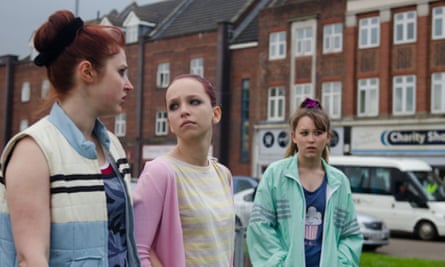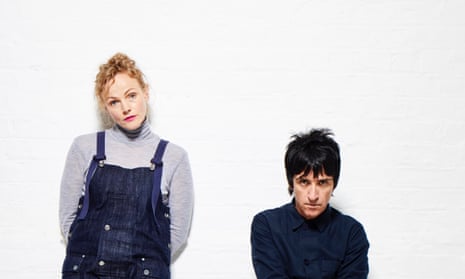Back in the autumn of 2014, Johnny Marr was about to release his second solo album, go on tour and get down to writing his autobiography. Maxine Peake, meanwhile, was playing Hamlet in a feverishly received production at the Royal Exchange theatre in Manchester. Marr had seen her in the film Keeping Rosy and enthused to an interviewer about the rarity of a “British suspense movie”. He added that she was “a good advertisement for British actors”. Peake sent him a thank-you letter – written on paper and put in the post.
Some time later, they arranged to meet in a city-centre cafe. “I still remember being stood outside where we were meeting,” she says now, “being on the phone to my fella – and, literally, there were beads of sweat on my top lip. I said: ‘I’ll probably only be 15 minutes.’ And then five hours later, I emerged.”
“I was asking her about getting into character, rehearsals, working with directors,” says Marr. “We clicked straight away.” Before they went their separate ways, he mentioned a project he had been turning around in his head for a few months: an album of music, with a big spoken-word element, whose theme would be “what it feels like to be alive in the UK right now”.
The first fruits of their partnership are now about to be released: a five-minute piece entitled The Priest, which has been turned into a short film, co-directed by Marr, set in the centre of Manchester. The words are a vivid first-person account of homelessness. They were written by a man and originally located in Edinburgh, but Peake’s voice lends them a gender-less universality. In the film, the lead role is played by the 20-year-old actor Molly Windsor – who starred in Three Girls, the BBC dramatisation of the Rochdale grooming scandal in which Peake played Sara Rowbotham, the heroic sexual health worker whose warnings about child sexual exploitation were repeatedly ignored.
As with Three Girls, The Priest stands as a rare contemporary piece of social realism – though Marr is keen to underline the fact that its primary motivations were artistic. “I want it to be a good listen,” he says. “As a musician, that’s my priority, no matter what the subject matter is. I always want to honour that. Ultimately, that’s my job.”
“It’s about asking questions,” says Peake. “Everybody’s in a situation, everybody has a story. It’s about finding out why. We take things at face value, don’t we? You form an opinion about something immediately, but you ought to step back a bit. Take in the vista first.”
The two of them are speaking in a cosy rented cottage in the foothills of Snowdonia, where Peake – who is staying here with her husband, Pav – is working on a feature film called The Dark Outside, set in 1855 and centred on a mother and daughter whose farm is threatened by the owners of a slate mine. (“I suppose the gist of the story is the evils of capitalism, really,” she says.) Along with his wife, Angie, Marr has driven here from his home in south Manchester, bringing with him a handful of other tracks voiced by Peake, which include not just pieces about lives on the edge of society, but one gorgeous track created to evoke, as Marr puts it, “finding a piece of green in the middle of the city and just having a serene 20 minutes in the middle of all the concrete and frenetic activity”.
They do not quite look like members of the same cultural tribe: Marr in the elegantly casual attire – blue cardigan, scarf, black drainpipes – of the bohemian rock’n’roller; Peake with her hair drawn back, dressed in a long skirt that almost suggests the period in which her latest film is set. But they are clearly fast friends, at ease in each other’s company and full of enthusiasm for what they have been creating. Punctuated by breaks for gloriously strong tea, they talk for almost three hours – about music, drama, politics and more.

Their backgrounds are full of common threads. In preparation for a role that never materialised, Peake once had drumming lessons from Marr’s estranged Smiths colleague Mike Joyce. In the 80s, Marr was involved in Red Wedge, the collective of musicians and creative types that aimed to mobilise opposition to the Thatcher government and bring young people into contact with the Labour party; 30 years on, Peake is a high-profile champion of Jeremy Corbyn. More generally, the two of them share working-class roots and a sense of Manchester and its surroundings as home – along with a deep conviction that drama and music should reflect their time.
When they began working together in 2016, the issue of homelessness was uppermost in their minds. “You can’t avoid it in Manchester,” says Marr. “It touched us both.”
By then, Peake was back on stage in the city, starring as Blanche DuBois in A Streetcar Named Desire, and often chatting to people bedding down in the middle of town. “I would come out every night at 11 o’clock and there was a gang of guys who always used to camp on the steps of the theatre,” she says. “And there was another guy called Steve who was always at the car park I was using. One night, he was sat with another guy, who looked official. He had a clipboard. I said, ‘Are you all right?’ And Steve said: ‘My friend’s just OD’d. I tried to resuscitate him.’ There was a couple nearby, with a Streetcar programme and a few policemen who had obviously just moved the body. The woman said: ‘Oh, some homeless bloke’s just died – will you sign my programme?’ And I thought: ‘This is just the norm now.’”
“It was really blowing up on a week-by-week basis: people living in tents, the attacks by some homeless people on others, the sort of territorial side of it,” says Marr. “Quite quickly, through our experiences and our conversations, a picture started to emerge of this huge crisis.”
He was also struck by the mounting visibility of homelessness in London. “I would notice the youngish to middle-aged man who just seemed to be on his first or second step towards the great downfall. I don’t know any other way of putting it … It was like seeing a homeless man in training. There might be a few homeless men together, who’d obviously been on the street for a while. And you’d notice the guy who’d obviously not been on the street that long, who had just joined the fray. And you’d think: ‘Where’s this going to end?’”
Peake found the text she would use for The Priest online, in a diary written by Joe Gallagher, a contributor to the Scottish edition of the Big Issue who had documented his time on the streets in Edinburgh. In the original text, he is the titular Priest, given the name because of his avoidance of alcohol and drugs, a theme carried over into the experiences portrayed by Windsor in the film.
“Straight away, that’s striking a blow and making a point,” says Marr. “Why should it be that every homeless person you see on the street is there because of substance abuse?”
The accompanying film, he says, contains other scenes that defy easy assumptions. “One of the characters who comes and bothers her is a fucked-up, annoying idiot. He’s intoxicated and he’s dressed like a businessman. But she’s not in danger of being attacked. It’s just an annoying drunk man who has been out, and even his mates have fucked off. We all know that guy. So as this story started to unfold, I thought: ‘This is brilliant. There’s no mention of any fear of attack, there’s no overt self-pity and there’s a sort of poeticism in it.’ It breaks a load of stereotypes.”
I last interviewed Marr three years ago, when he talked about everything from the rise of Ukip to the coalition government’s attacks on the welfare state. “Traditionally, it’s always been the job of the artist to flag these things up and stand in opposition to oppressive forces, even just to ask questions,” he said. He talked about the large-scale disappearance of those obligations and the reasons why: pressure from record companies, exile from the broadcast media, even restrictions on touring abroad.
Peake says there is a similar picture in her field. “Trying to get involved in something that’s either got some sort of social conscience or is political with a small P is very difficult. I don’t think people think it makes money. It’s, ‘Oh well, it’s austerity – nobody wants to watch that. They want entertainment, entertainment, entertainment.’”

“It’s about very reductive commercial considerations, coming from a place of fear,” says Marr. “There’s bar-lowering all the time.” He goes on: “But isn’t it a great thing that the UK once made Cathy Come Home and Boys from the Blackstuff?”
“They’re still stuck in our psyche, aren’t they?” says Peake. “We’ve not got a modern equivalent.”
“Well, there’s Three Girls,” says Marr. “That made me think straight away about Cathy Come Home and that lineage. I was just a little kid when Cathy Come Home came out, but when Boys from the Blackstuff was on TV, it really struck a chord. It made you sit up and learn something, but it entertained you at the same time. It can still be a fantastic medium.”
Three Girls had five million viewers. “I’ve never had so much positive feedback from people stopping me in the street – and not because they wanted to talk about my performance, but about the story,” she says. “They’d say, ‘We didn’t know. We’ve always classed these girls as being a bit … lifestyle choices, blah blah blah. And it really woke us up.’ At the start, I did think: ‘Maybe people aren’t interested in these dramas any more.’ But they are.”
If Marr and Peake have a shared sense of trying to keep socially engaged art alive in industries that seem to have little interest in it, I wonder whether that might reflect the domination of the arts by middle-class voices and the fact that people from working-class backgrounds are increasingly invisible. Marr says that factors as basic as the absence of affordable rehearsal spaces now “exclude the poorest economic level of young person who wants to be in a band”; Peake says she worries about the impossible costs of studying drama.
This brings us to their own backgrounds and how much they now set Marr and Peake apart. “People say: ‘Oh, you’re middle class now,’” considers Peake. “But I’m a believer that if you’re born into a class, you stay in that class. Unless you consciously want to pull yourself out of it, but I never have.”
She presumably moves in a very middle-class world now. “Yeah, I suppose. But some people are actors, full-time. When I’m not acting, I don’t feel like an actor. I live in Salford, do you know what I mean? I don’t get invited to many dinner parties. I don’t enjoy that side of it anyway. For me, I’m still always that kid from Bolton.”
“I can’t help but feel like the sum of my experiences now,” says Marr. “I’m kind of OK about that. I’ve travelled a lot over the last 30 years. I have a sense that that’s informed my worldview, without a doubt. I always say that I’m aware of being fortunate.” He pauses. “But there are so many things about being working class that never leave you entirely. A certain gratitude. A kind of humility, whether it’s forced on you or not. You could even call it guilt, I guess: working-class guilt.”
“There is a guilt, yeah,” says Peake. “A friend said to me, ‘Are you sure you’re not a Catholic? ’Cos you’re riddled with guilt.’ It’s tied up with a work ethic. You’ve got to be seen to be grafting for what you’re doing. You know what I mean? Constantly.”
Marr says of Peake at one point: “I’ve actually met someone who probably works even more than me, if that’s possible,” and Peake’s résumé suggests he’s not wrong. Next year will see the release of Funny Cow, in which she stars as a female standup trying to push her way through the grimness of 70s Britain, as well as the staging at the Royal Exchange of Queens of the Coal Age, the play Peake has written about the true story of four women resisting the closure of a Yorkshire coalmine.
She has just finished filming her role in Mike Leigh’s dramatisation of the Peterloo massacre of 1819. “I wrote to him and asked if I could be in it,” she says. “And he wrote back and said: ‘Of course you can.’” She can’t give too much away about the film or her role, but she says it is full of modern resonances: “I think it says things about the powers that be and the lengths they’ll go to quash protest.”
Marr’s third solo album will be released next spring. He says he’s tried to resist politics with a capital P intruding, but the new music inevitably reflects the wider world. “There’s a track called Bug, which is about the virus of the rightwing and bolstering our immune systems. And there’s another song that is about the feeling directly after Trump and Brexit, but it turned into a story of escaping into this kind of alternative society. There are a few songs that imagine an escape from – I’ve got to say it – dystopia.”
Of late, the political gap between him and his former creative partner in the Smiths has become increasingly obvious. Marr says he was “crushed and heartbroken” by the vote for Brexit, whereas Morrissey seemed to rejoice in it. Though Marr has remained firmly on the political left, Morrissey now seems to champion the reactionary right. How does he feel about the fact that they have seemingly ended up at opposite ends of the political spectrum?
“I don’t really care about it very much. I really don’t. It’s just a kind of story for other people. Genuinely, it’s, like, who cares?”
But it’s true, isn’t it? They have diverged, massively.
“I’ve stayed the same. I’ve never changed. But … people tend to forget that it was 30 years ago that we were in a band together. Stop and think about it: 30 years. It’s a long time. So I honestly don’t care very much.”
His energies, he insists, are more than taken up by what’s next – his new music, the material he and Peake are creating (a full album, he says, may appear midway through 2018), and the prospect of bringing their project to the stage. He says he relishes the prospect of “taking what I do into a theatre and working with a director”.
Peake seems energised by her involvement in music. “I find that, as an actor, I now get more inspired by watching gigs,” she says. “There’s something about watching people like Johnny. I’ve become fascinated by that connection with the audience. As an actor, you’ve got to have that. You’ve got to give them a piece of your soul. And the more I go to gigs, the more I get fascinated by that.”
“We went to see Kraftwerk, didn’t we?” says Marr. “And Nick Cave.”
Peake lets out a gasp. “Oh my God – he’s shamanic.”
As well as social realism and the joys of creativity, it seems their bond is also based on the straightforward joy of a great night out. “This is the fantastic thing about this partnership,” says Marr, with a laugh. “Either I’m on Maxine’s guest list or she’s on mine.”
This year’s Guardian and Observer charity appeal is raising money to tackle youth homelessness and destitution among asylum seekers. Support our three chosen charities by donating at guardian.charitiestrust.org











Comments (…)
Sign in or create your Guardian account to join the discussion